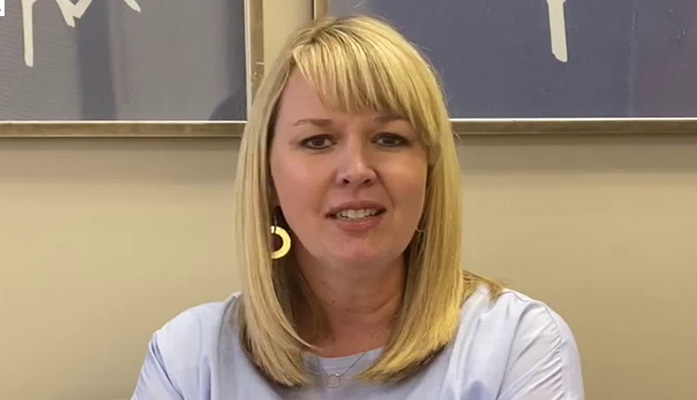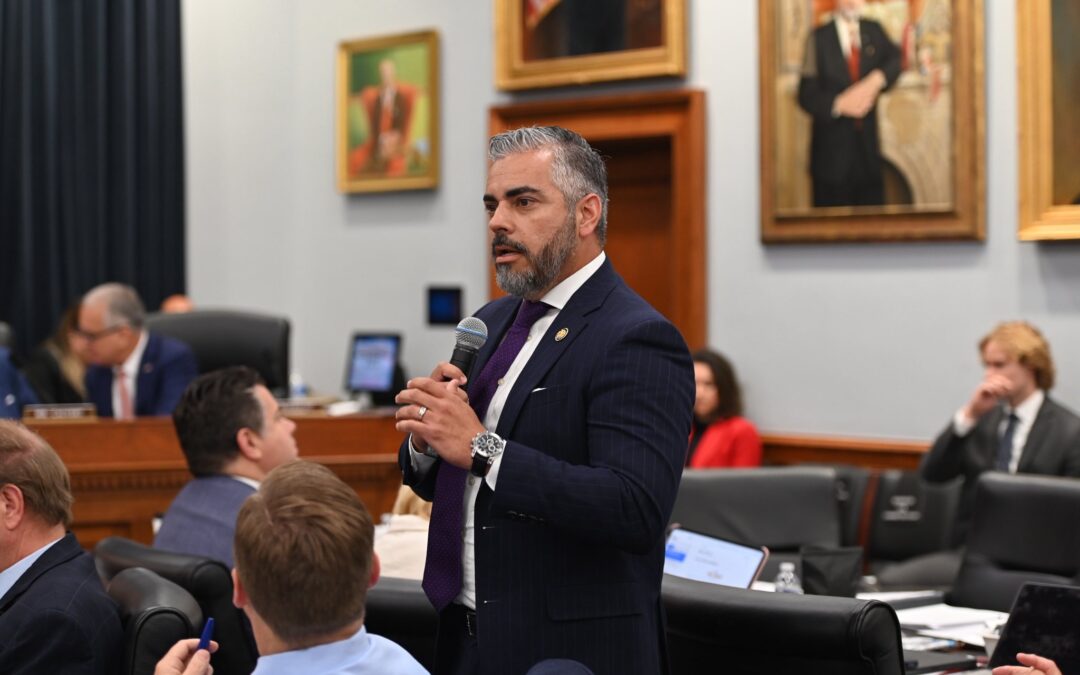
by Ethan Faverino | Sep 22, 2025 | Education, News
By Ethan Faverino |
Arizona Superintendent of Public Instruction Tom Horne is urging the Phoenix Union High School District to reverse its decision to reject armed officers on campus following a violent knife fight between two female students at Carl Hayden High School.
The altercation, reported by the Phoenix Police Department, occurred just after 9 a.m last Monday. Officers responded to reports of a physical fight during which one student struck another with the handle of a closed-blade pocketknife.
The student with the pocketknife was referred to the Juvenile Court Center and faces one count of aggravated assault. The injured student received treatment for minor injuries, and the incident remains under investigation. Horne emphasized the critical need for armed officers, stating, “The safety of students, teachers, and staff members at schools is not negotiable, and a knife fight on the Carl Hayden campus Monday shows the dangers are increasing. This needs to stop immediately. The Phoenix Union governing board needs to reverse a terrible decision they made earlier this year when they rejected requests from the leadership of both Carl Hayden and Betty Fairfax high schools for armed officers on campus.”
“Yesterday, Phoenix Police reported that two female Carl Hayden students were in a knife fight that resulted in injuries,” Horne added. “This proves the need for armed officers and demonstrates the utter lack of concern by the members of the Phoenix Union government board who rejected the request for officers that had been endorsed by the two schools and district administration. It was an outrageous dereliction of responsibility, and the board needs to reconsider this matter immediately.”
The incident at Carl Hayden High School is part of a broader pattern of safety concerns within the Phoenix Union High School District. Earlier this year, a tragic stabbing at Maryvale High School resulted in the death of a 16-year-old student, prompting scrutiny of campus security protocols.
Phoenix Union Governing Board member Jeremiah Cota requested reconsideration of the board’s earlier vote back in August 2025, but again, the Phoenix Union board voted to deny state-funded officers. Cota tweeted, “There will be NO school resource officers agenda item at the Phoenix Union next board meeting. The Board President has refused my calls for improving school safety once again. Shameful for this district to put anti-law enforcement politics before student and staff safety.”
Ethan Faverino is a reporter for AZ Free News. You can send him news tips using this link.

by Matthew Holloway | Sep 22, 2025 | News
By Matthew Holloway |
The Legislative District 10 Republican Committee in East Mesa has unanimously censured Councilwoman Julie Spilsbury for using her non-partisan office to campaign for Democrats in 2024. The censure also condemned her for voting in favor of allowing men to use women-only facilities.
Spilsbury, who is facing a recall challenge this year, became embroiled in a scandal after making public endorsements of Vice President Kamala Harris in the 2024 Presidential Election, in addition to endorsing Arizona Democrats Congressman Greg Stanton, Arizona Secretary of State Adrian Fontes, and Senator Ruben Gallego. The recall campaign, supported by Turning Point Action, submitted the 5,000 required voter signatures in May. Spilsbury is facing a challenge for her seat from conservative Dorean Taylor.
The censure from the LD10 Republicans lays out a case against Spilsbury for her endorsements of Harris, Stanton, Fontes, and Gallego despite her membership in the Republican Party, as well as her vote for “a non-discrimination order that allows men in women’s private spaces, and potentially penalizes business owners, forcing them to disregard or contradict their religious convictions and compromise their religious freedom and rights or be fined due to the ordinance,” according to a statement from the Committee.
The Committee also alleges that Spilsbury, “has benefited from her endorsements and publicly announced the offer of support and assistance in the current recall election, including Democrat Senator Ruben Gallego, the Democrat CD4 Representative, Greg Stanton, and the Democrat Secretary of State, Adrian Fontes.”
Spilsbury told Axios in July that the three Arizona Democrats have reached out to her to offer their support in her recall. She openly acknowledged the likely outcome of her endorsement of Harris in the 2024 Presidential election, telling the outlet, “I did what I did with my eyes wide open. I knew it wasn’t going to be popular.”
In the text of the censure, the committee resolved, “The Republican Committee of Legislative District 10 calls on Republican voters in Mesa to heed this vote of no confidence, cease recognition of Recalled Councilwoman Spilsbury as a Republican in good standing and cease support for Julie Spilsbury in any elected or appointed capacity, or future election for any prospective office.”
Earlier this month, the Arizona Freedom Club PAC officially endorsed Dorean Taylor in the Mesa Recall Election. Scot Mussi, Chair of the Arizona Freedom Club PAC said in a statement posted to X, “Dorean Taylor is exactly the kind of leader Mesa needs—someone who will stand up for taxpayers and put families first. Her vision for safer communities, responsible government, and protecting hard-working families from higher taxes aligns with the values we fight for every day.”
Matthew Holloway is a senior reporter for AZ Free News. Follow him on X for his latest stories, or email tips to Matthew@azfreenews.com.

by Jonathan Eberle | Sep 22, 2025 | Economy, News
By Jonathan Eberle |
Arizona workers in Yuma and Lake Havasu City-Kingman have seen some of the strongest wage growth in the nation over the past five years, according to a new analysis of Bureau of Labor Statistics data.
The study, conducted by AlgoCademy, reviewed mean hourly wage changes across 395 U.S. metropolitan statistical areas between 2019 and 2024. It found that two Arizona metros ranked in the national top 50 for wage growth.
Yuma placed 11th nationwide, with mean hourly wages climbing from $19.54 in 2019 to $25.74 in 2024—a 31.73% increase. Lake Havasu City-Kingman followed at 26th, where average wages rose from $19.90 to $25.89, a 30.10% increase.
Nationwide, the strongest growth occurred in San Jose-Sunnyvale-Santa Clara, California, where wages jumped 44.29% to an average of $58.25 per hour, reflecting the tech hub’s continued economic strength. Other metros in the top five included Sebring, Florida (up 38.74%), Decatur, Illinois (37.89%), Boulder, Colorado (37.84%), and Bellingham, Washington (37.10%).
AlgoCademy’s founder and CEO, Mircea Dima, noted that the findings highlight a broad trend: wage growth is not confined to large urban centers. “Smaller and mid-sized areas like Grants Pass, Oregon, Modesto, California, and Logan, Utah are all seeing wage increases above 34%, showing that opportunities for higher earnings are spreading beyond major U.S. cities,” Dima said. “These trends are a clear sign that workers across the country are benefitting, which can have a positive effect on local communities, from boosting spending power to attracting new talent and investment.”
The research underscores that wage gains have been widespread. While high-growth areas like Silicon Valley continue to dominate in raw numbers, smaller regions—including several in Arizona—are seeing wages rise at a pace that outstrips many larger metropolitan areas. Arizona’s results put the state in strong company, showing that even outside its largest metros, wages have grown substantially since 2019.
Jonathan Eberle is a reporter for AZ Free News. You can send him news tips using this link.

by Matthew Holloway | Sep 21, 2025 | News
By Matthew Holloway |
In a key vote on Wednesday, the Arizona Corporation Commission, led by Commissioner Rachel Walden, unanimously repealed the state’s Energy Efficiency (EE) and Demand Side Management (DSM) Rules. The regulations, now 15 years old, have been expired since 2020, and according to the board, have cost Arizona ratepayers more than $1 billion in additional surcharges since inception.
Both APS and TEP have exceeded the requirements, the board noted, with Commissioner Márquez Peterson explaining, “The current standard required the accumulated savings of 22% of retail sales by 2020. We’ve had(sic) reconfirmed that as of 2024, APS is at 26.2% and TEP is currently at 28.52%. Both utilities have exceeded the standard which is out of date.”
“I cast my vote to repeal the rules because the rules were not based on any cost-effectiveness tests, nor did they contain any other ratepayer protection requirements. The mandates instead passed all program costs in support of the few on the backs of all ratepayers, especially onto those who can least afford it—our low- and fixed-income ratepayers, and our hardworking Arizona families,” Commissioner Walden said in a statement Thursday.
“I fully support the use of EE mechanisms and DSM programs, which have demonstrated energy savings, especially during peak summer heating days when our energy needs have stressed the electrical grid. What I do not support is the cost shifts and economic burdens these mandated programs have created, costing ratepayers in excess of $1.1 billion.”
Commissioner René Lopez noted during the meeting that the rules “were written over a decade ago.” He added, “We’ve had a lot of changes in technology, and a lot of changes in demand are coming, It served its purpose, everyone has met the requirements, now it’s time for them to go away.”
The commission explained that the repeal of the rules does not eliminate the EE/DSM program; instead, Arizona utilities will now be required to use All-Source Requests for Proposals when they create plans to address forecasted energy demands, with EE and DSM programs continuing as two categories of solutions that can be proposed for the utility’s consideration.
“I urge technology stakeholders to continue to propose these types of solutions to offset utility generation needs,” Walden added. “The solutions must be cost-effective, and the Commission will continue to evaluate these programs on a case-by-case basis during rate cases. I recently offered an amendment to approve a Bring Your Own Device DSM program for APS customers that did not create a cost shift, and that amendment was adopted by majority vote by this Commission.”
Commissioner Márquez Peterson added in a statement, “As a Commissioner, I will continue to communicate to utilities my support for effective EE programs in future rate cases. These programs can save ratepayers on their electricity bills and help us ensure we have reliable energy during peak times of the day.”
Matthew Holloway is a senior reporter for AZ Free News. Follow him on X for his latest stories, or email tips to Matthew@azfreenews.com.

by Matthew Holloway | Sep 21, 2025 | News
By Matthew Holloway |
On Tuesday, the Cochise County Supervisors voted to ask U.S. Attorney General Pam Bondi to investigate the certifications and laboratory accreditation of the county’s voting systems ahead of the 2022 election.
In a letter from Cochise County Board Chairman Frank Antenori, the board requested that “information from the United States Department of Justice concerning the accreditation of the voting system test laboratories (VSTLs), the certification of ES&S electronic voting systems, and the use of engineering change orders during the 2022 Arizona general election.” He added that “these matters present material statutory and constitutional questions that relate directly to the integrity of the electoral process in Arizona.”
Antenori also observed that the Board has “a constitutional and statutory obligation to ensure compliance with election law,” citing Article 7, Section 7 of the Arizona Constitution that governs the tabulation of “legal votes.”
He explained that the United States Election Assistance Commission (EAC) “has invoked 52 USC § 20971(c)(2) to argue that accreditation remains valid indefinitely absent formal revocation. Respectfully, the plain text of the statute requires renewal on a biennial basis.”
The Chairman went on to point out that the accreditation had lapsed in March 2020 and stated, “The EAC’s interpretation appears inconsistent with both the statutory language and congressional intent.”
In particular, Antenori observed that A.R.S. 16-442 (B) requires the following: “Machines or devices used at any election for federal, state or county offices may only be certified for use in this state and may only be used in this state if they comply with the Help America Vote Act of 2002 and if those machines or devices have been tested and approved by a laboratory that is accredited pursuant to the Help America Vote Act of 2002.”
The accreditation question led two Republican supervisors to delay the county’s election certification in 2022 until they were ordered to do so by a judge. A state grand jury later indicted the two supervisors on charges brought by Arizona’s Democrat Attorney General Kris Mayes. Supervisors Tom Crosby and Peggy Judd, both Republicans, faced charges of conspiracy and interference with an elections officer. Judd pleaded guilty while Crosby awaits trial.
As reported by VoteBeat’s Jen Fifield, the letter to AG Bondi was proposed by Crosby after he was reelected last year. The executive session in which the letter was discussed was closed to the public; however, Fifield reported that Crosby attached a 30-page document to the meeting minutes, providing the board with additional details and even a piece of grand jury testimony from his case.
On Monday, Fifield reported that a judge rejected Crosby’s request to delay his case, and his trial date will still be set on Sept. 22.
Matthew Holloway is a senior reporter for AZ Free News. Follow him on X for his latest stories, or email tips to Matthew@azfreenews.com.

by Ethan Faverino | Sep 21, 2025 | News
By Ethan Faverino |
Congressman Juan Ciscomani (AZ-06) marked a personal milestone on September 18, 2025, commemorating 19 years since he became a U.S. citizen and reflecting on his remarkable journey from a congressional intern to a member of the United States Congress.
In a heartfelt post on X, Ciscomani shared a touching moment of his parents visiting him on Capitol Hill, 18 years apart, highlighting the opportunities afforded by the American Dream.
“Same place and same people, 18 years apart,” Ciscomani wrote. “In 2006, my parents visited me on Capitol Hill. I was a Congressional intern with a Green Card. Now they’re back visiting me again. And I’m a member of Congress with a Green Pin. Grateful for the opportunities our great nation offers!”
Ciscomani, who represents the Arizona 6th Congressional District, also celebrated the 19th anniversary of his U.S citizenship, recalling the moment he raised his right hand and became a citizen.
“From the son of a bus driver to serving in the United States Congress—my story and millions of other stories are only possible in the greatest country on earth. Grateful for the blessings of citizenship and the American Dream!” said Ciscomani on X.
Before his election to Congress in 2022, Ciscomani served as the senior advisor to Arizona Governor Doug Ducey and held leadership roles in the Tucson Hispanic Chamber of Commerce, where he advocated for economic growth and community development.
As a member of Congress, Ciscomani has focused on issues critical to his constituents, including border security, economic development, and veterans affairs. He serves on the House Committee on Veterans Affairs and House Committee on Appropriations, where he advocates for policies to strengthen Arizona’s communities and support the nation’s veterans.
Ethan Faverino is a reporter for AZ Free News. You can send him news tips using this link.






